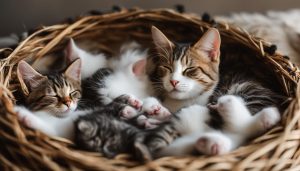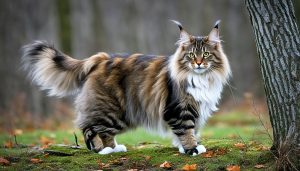Cats go through different life stages that involve changes in growth and behavior. Understanding these stages is crucial for providing the best care for your cat at each age. From kittenhood through to their senior years, cats exhibit distinct behaviors that are influenced by their age.
Key Takeaways:
- Cat behavior varies depending on their age.
- Understanding feline behavior by developmental stages is important for their well-being.
- As cats age, their behavior changes and they reach different milestones.
- From playful kitten behavior to more relaxed senior cat behavior, each stage requires specific care and attention.
- Adapting your cat’s care to their age will help strengthen your bond and ensure their happiness.
The Kitten Stage (0-6 months)
During the kitten stage, which lasts from 0 to 6 months, cats are the most curious and playful. They engage in behaviors such as pouncing and pawing at objects. This is a crucial time to introduce them to litter box habits and crate training. Feeding a balanced raw diet is also recommended for optimal nutrition during this stage.
As kittens explore their surroundings, it’s important to provide them with a safe and stimulating environment. They are naturally curious and eager to explore new things, so ensure that your home is kitten-proofed to prevent any accidents or harm. Offer them a variety of toys and scratching posts to redirect their playful energy and prevent destructive behavior.
| Kitten Behavior | Description |
|---|---|
| Curious Behavior | Kittens have a natural curiosity and will investigate their surroundings with enthusiasm. |
| Playful Behavior | Kittens have boundless energy and love to engage in play, chasing toys and batting at objects. |
| Litter Box Training | Introduce kittens to the litter box early on and provide a clean and accessible place for them to relieve themselves. |
| Crate Training | Train your kitten to feel comfortable in a crate, which can be useful for transportation or creating a safe space. |
| Feeding a Raw Diet | Consider feeding your kitten a balanced raw diet to provide them with essential nutrients for growth and development. |
By focusing on their unique needs and providing the right care and training, you can help your kitten develop into a well-behaved and happy cat.
The Junior Stage (6 months to 2 years)
The junior stage is a crucial period in a cat’s life, spanning from 6 months to 2 years. During this time, cats experience significant changes in behavior as they transition from playful exploration to a phase of boundary testing. It is a time when cats reach sexual maturity and may exhibit challenging behaviors.
One common behavior observed during the junior stage is the testing of boundaries. Cats may become more assertive and push boundaries to establish their territory and assert their independence. This can manifest as increased aggression or assertive behaviors such as scratching and biting.
Quote: The junior stage is a pivotal period where cats experience a natural transition into adolescence, marked by boundary testing and increased independence. Understanding and effectively managing these behaviors is crucial for a harmonious relationship with your cat.
To ensure the well-being of your cat during this stage, it is important to engage them in mental and physical enrichment activities. Providing interactive toys, puzzle feeders, and play sessions can help satisfy their need for stimulation and prevent boredom-related behaviors.
Additionally, it is essential to establish clear boundaries and consistently enforce them. Positive reinforcement techniques, such as rewarding desired behaviors and redirecting aggression toward appropriate outlets, can help shape their behavior in a positive way.
Preventing scratching and biting is also important during this stage. Providing appropriate scratching posts and keeping nails trimmed can help redirect their natural instinct to scratch onto acceptable surfaces.
Mental and Physical Enrichment Activities for Junior Cats:
- Interactive toys that challenge and engage their problem-solving skills
- Puzzle feeders to provide mental stimulation during meal times
- Play sessions with a variety of toys to encourage physical activity
- Hide-and-seek games to stimulate their hunting instincts
It is crucial to maintain patience and understanding during the junior stage as your cat navigates through this transitional phase. With proper guidance, mental and physical stimulation, and consistent boundaries, you can help your cat develop into a well-adjusted adult.
The Prime Stage (3-6 years)
During the prime stage, which occurs between 3 to 6 years, cats are at their most active and healthy. They have fully transitioned from the playful and curious kitten stage to a more settled adulthood. While they may still have bursts of playful energy, they also enjoy lounging and sunbathing. It’s important to provide them with opportunities for mental and physical stimulation to maintain their well-being.
One key aspect of maintaining a healthy cat behavior during the prime stage is by ensuring they have a well-rounded diet. A balanced and nutritious diet supports their overall health and provides them with the energy they need for their active lifestyle. Consult with your veterinarian to determine the best diet plan for your cat and consider incorporating high-quality cat food that meets their specific nutritional needs.
Routine vet checkups are vital during the prime stage to monitor your cat’s health and detect any potential issues early on. By scheduling regular visits to your veterinarian, you can ensure that any underlying health conditions are addressed promptly, maintaining your cat’s well-being throughout this stage of their life.
Here are a few key points to remember during the prime stage:
- Engage your cat in daily play sessions to fulfill their need for mental and physical stimulation.
- Provide a variety of toys and scratching posts to keep them entertained and prevent destructive behavior.
- Ensure they have access to fresh water at all times to stay hydrated.
The Importance of Exercise
Regular exercise is crucial during the prime stage to keep your cat active and maintain their muscle tone. Engage them in interactive play sessions using toys and encourage them to chase, pounce, and climb. This not only helps them burn off excess energy but also promotes a healthy weight and prevents obesity, which can lead to various health issues.
Remember to monitor your cat’s activity level and adjust their diet accordingly. If your cat becomes more sedentary, they may require fewer calories to maintain a healthy weight. Your veterinarian can provide guidance on proper portion sizes and dietary adjustments based on your cat’s individual needs.
“The prime stage is a vibrant time in a cat’s life where they are at their most active and healthy. It’s important to provide them with a well-rounded diet and routine vet checkups to ensure they thrive during this stage.” – Dr. Emily Thompson, DVM
The Mature Stage (7-10 years)
As cats enter the mature stage, typically between 7 to 10 years old, they may start to exhibit changes in behavior. One common change is a decrease in activity levels. You may notice that your mature cat becomes less interested in playtime and spends more time lounging or sleeping. This is a natural part of the aging process and should not be a cause for concern.
Monitoring your cat’s eating habits is also important during this stage. Some mature cats may experience a decrease in appetite, while others may develop a tendency to overeat. It’s essential to monitor their food portions and adjust accordingly based on their activity level and weight. Maintaining a healthy weight is crucial for avoiding weight-related health issues in mature cats.
“Mature cats may exhibit decreased activity levels and changes in eating habits.”
To ensure your cat’s well-being during this stage, it’s essential to provide them with a comfortable environment that supports their changing needs. This may include providing soft bedding, easy access to their litter box, and ensuring their food and water dishes are easily accessible. Regular veterinary check-ups are also important for monitoring any age-related health issues.
Understanding and adapting to the changes in mature cat behavior will help you provide the best care for your feline companion during this stage of their life.
The Senior Stage (11-14 years)
As cats enter the senior stage, typically between the ages of 11 and 14, they experience physical and behavioral changes that require special attention from their owners. At this age, cats are equivalent to 70 human years old. It’s important to understand the unique needs of senior cats to ensure their health and well-being.
One common change in senior cats is an increase in sleep and a decrease in overall activity. Don’t be alarmed if your once energetic cat becomes more sedentary. It’s a natural part of the aging process. However, it’s essential to provide them with a comfortable and safe environment that supports their reduced mobility.
Regular vet checkups are crucial during the senior stage. By scheduling routine appointments, your vet can monitor your cat’s health and catch any age-related issues early on. Common health issues in senior cats include arthritis, kidney disease, feline diabetes, dental problems, and hyperthyroidism. Early detection and treatment can significantly improve their quality of life.
Another essential aspect of caring for senior cats is their diet. A well-balanced, age-appropriate diet is critical to support their immune system, circulatory function, and digestive health. Consult with your vet to determine the best nutritional plan for your senior cat. They may recommend a diet rich in nutrients such as omega-3 fatty acids, antioxidants, and joint support supplements.
While providing a well-rounded diet and regular vet checkups are crucial, don’t overlook the importance of daily interaction and mental stimulation for senior cats. Engage your cat in play, puzzles, and other activities that keep their minds active and prevent boredom.
Quote: “Caring for senior cats requires a holistic approach that encompasses their physical, mental, and emotional well-being. By addressing their unique needs, you can ensure your senior cat lives a comfortable and fulfilling life.”
Remember, every senior cat is unique, and they may require individualized care based on their specific health conditions and personality. Be observant and responsive to any changes in behavior or appetite, as these can be signs of underlying issues.
Tips for caring for senior cats:
- Provide a cozy and accessible sleeping area.
- Ensure easy access to food, water, and litter box.
- Incorporate interactive toys and puzzles to keep their minds stimulated.
- Monitor their weight and adjust their diet accordingly.
- Keep their environment stress-free and quiet.
By following these tips and offering love and support, you can ensure that your senior cat enjoys their golden years to the fullest.
The Geriatric Stage (15 years and beyond)
As cats enter the geriatric stage, typically at 15 years and beyond, they may face various medical issues and require extra care and comfort. It is essential to provide them with easy access to food, water, and a litter box to ensure their well-being.
One of the primary concerns during this stage is ensuring that geriatric cats receive adequate nutrition. They may have difficulty jumping or climbing, so it is important to place their food and water bowls in easily accessible locations. Consider using elevated bowls or providing ramps to assist them in reaching their meals comfortably.
In addition to physical needs, geriatric cats may also experience changes in behavior. They may become less active and spend more time sleeping. Creating a comfortable and quiet space for them, with soft bedding and cozy hiding spots, can help them feel secure and relaxed.
Paying attention to litter box habits
Geriatric cats may have difficulties reaching the litter box due to mobility issues. It is important to provide easy access to a litter box with low sides or cut-out entrances. Placing multiple litter boxes on each floor of your home can also help prevent accidents or discomfort for your senior feline.
“Geriatric cats require special care and attention to ensure their comfort and well-being. Providing easy access to essential resources and creating a safe and comfortable environment are key aspects of caring for our aging feline friends.”
Regular vet checkups are crucial during this stage to monitor any age-related health issues and address them promptly. As cats age, they are more susceptible to conditions such as arthritis, kidney disease, and dental problems. Working closely with your veterinarian will help ensure that your geriatric cat receives appropriate medical attention and treatment.
In summary, caring for geriatric cats involves providing easy access to food, water, and litter boxes, creating a comfortable environment, and closely monitoring their health. By addressing their unique needs during this stage, you can help your aging feline friend enjoy a happy and comfortable life.
Conclusion
Understanding cat behavior is essential for providing the best care for your feline companion and ensuring their overall well-being. Cats go through different life stages, each with its unique behaviors and needs. By familiarizing yourself with these stages and adapting your care accordingly, you can nurture a harmonious and fulfilling relationship with your cat at every age.
From the curious and playful kitten stage to the more relaxed and senior stage, cats exhibit behaviors that are influenced by their age and development. During the kitten stage, cats are the most curious and playful, while the junior stage brings a shift to boundary testing. The prime stage is characterized by peak activity and health, whereas the mature stage sees a decrease in activity. The senior stage brings further changes in behavior, and the geriatric stage requires special care and attention.
Adapting your care based on your cat’s life stage involves providing appropriate mental and physical stimulation, maintaining a balanced diet, and scheduling regular vet checkups. Understanding cat behavior by age enables you to spot any potential issues early on and address them proactively, ensuring your cat’s long-term health and happiness.










